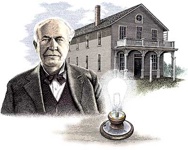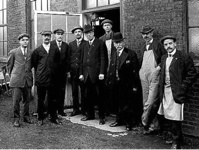 Sam Metcalf recorded the following post taken from a magazine story on Thomas Edison, the famous American inventor.
Sam Metcalf recorded the following post taken from a magazine story on Thomas Edison, the famous American inventor.
Several lines from the article caught his attention–and mine as I read his post. I’m still wrestling with “innovative teams” necessary to build movements. It seems that productive, creative teams are critical both to health of the “organism” and to breaking the code of “entry” into a lost, but seeking world.
“Central to Edison’s success was his ‘invention factory’, bringing together great people, constant prototyping and a culture of innovation and enterprise … He believed that, while ‘books show the theory of things, doing a thing itself is what counts.’ He saw failure as part of the inventive process.”
Sam commented that he continues to be amazed at how movements can ossify and institutionalize.
“Organizational gravity inevitably pulls toward institutionalization. The justifications used by the bean counters, policy makers, and those who must have rules and regulation are legion: “accountability…stewardship…excellence”…can all be admirable labels for clubs that are used to beat innovation and an entrepreneurial spirit out of an organizational culture.
In my experience the only way to keep an edge and a step ahead of the maintainers is to recruit and empower a steady stream of what Edison called “muckers.” They are the trailblazers who simply need running room and someone to believe in them. That’s why recruiting such men and women in the emerging generation is one of my top priorities. I believe nothing has the capacity to bring about as much lasting, transformational change as this. It’s part of my own personal mission statement.
Edison’s Muckers circa 1876
 “In selecting what he called his ‘Muckers’, he [Thomas Edison] prized curiosity, reasoning, resilience and versatility over specialization …He was a magnet for talent from all over the world. Over time, a team of virtuosos emerged that he entrusted to deliver on his dreams and generously rewarded in return.”
“In selecting what he called his ‘Muckers’, he [Thomas Edison] prized curiosity, reasoning, resilience and versatility over specialization …He was a magnet for talent from all over the world. Over time, a team of virtuosos emerged that he entrusted to deliver on his dreams and generously rewarded in return.”
“Edison was one of the boys yet still the authoritative leader. If expectations on his team were at times impossibly high, the atmosphere was informal and freewheeling. The ‘Muckers’ did not work to any rules,’ said Edison, ‘because they were trying to achieve something.’ Announcing momentous success before the solution was even in his view. He stretched his Muckers, creating an astounding esprit de corps in the process.”
God, give me a life surrounded by a growing number of “muckers!”
(Quotes are from Bill Fischer, professor of technology management at IMD, and Andy Boynton, dean of the Carroll School of Management at Boston College).
Leave a Reply